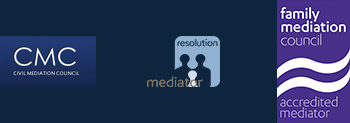Mediation is a form of Alternative Dispute Resolution, or ADR.
It is a process in which parties to a dispute work together assisted by a neutral third party to come to an agreement which is mutually acceptable. It is an entirely voluntary process, although increasingly the courts expect parties to have at least attempted to mediate their dispute before resorting to a trial. It is also very successful – around 85% of disputes where the parties agree to mediate are settled successfully. It is commonly used in a wide variety of disputes including family issues, marital breakdown, commercial and contractual problems or difficulties in the workplace, community or school.
The process itself is entirely straightforward
Generally, the parties will have sent the Mediator documents outlining the nature of the disagreement, and their position. They will then meet somewhere which is acceptable to everyone involved, and in which each can feel comfortable. Usually the session is begun with a round table in which the Mediator introduces himself and the process and describes how the day might proceed. The session will then begin in earnest and may include round table sessions with everyone present or a succession of private sessions with only one party talking to the mediator. It may also involve a mixture of both – no two sessions are quite alike. Usually the sessions last half a day, although this is driven by the complexity of the issue in dispute. In certain circumstances, such as when the participants live very far apart, we can offer mediation by video link.
Mediation can be entered into at any stage
of a dispute and any commercial settlement reached is legally binding once it is put in writing and signed by the parties. In family disputes the proposals are binding after they have been formally endorsed by the Court. The settlement reached is one which will be acceptable to both parties – there are no winners and losers in mediation and the solution arrived at may well include terms that are simply not available to a court. This may be particularly important if there is a need to maintain an ongoing relationship between the parties; for example within a family or community or between business associates. Perhaps because of their involvement in identifying a settlement, studies have shown that the rate of compliance with the settlement is very high and so, while the agreement is legally enforceable, recourse to proceedings for recovery is very rare.
The key feature of mediation is that it is controlled entirely by the parties themselves
Not only do they choose to enter into mediation, but they also retain control over the process throughout and they elect the terms of the settlement. The Mediator is not a judge or an arbitrator – he or she will not weigh the arguments of each side and then declare a winner and dictate the terms of the settlement.
Mediation is fast and it is cost effective
Generally speaking, a mediation session can be arranged at short notice – generally within a couple of weeks. This compares very favourably with the amount of time that parties can expect to wait before their case comes before a court. This speed can be very important to cases involving family members or small businesses with narrow margins.
Mediation is entirely confidential
With the exception of cases involving children, most court proceedings are open to the public and may even be reported in the press. This is not the case with mediation which is conducted between the parties entirely behind closed doors. Also, the parties enter into an agreement which ensures that nothing said behind those closed doors is later relied upon by one party without the permission of the other.
What is mediation like?
We frequently get asked what the process of mediation feels like from the point of a view of a participant. Although there is some information available on this site, it is a difficult question to answer briefly. Caroline, one of our mediators, has published an ebook on the subject, which is available here.


